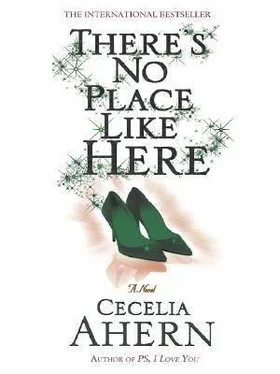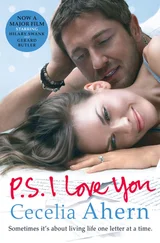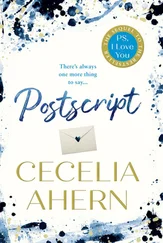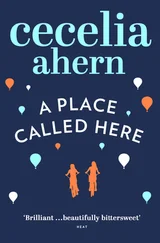I looked at her and didn’t know where to start. “So, Orla, tell me a bit about yourself.”
I watched her as though in a trance, watched the lips I’d seen only in photographs open and close, her face animated, alive, and I listened to her words. The singsong tone of her Cork accent, the way her long blond hair moved as she spoke. I was enthralled.
When she got to the part about studying in college I saw my chance to jump in. “Art history in Cork University?” I repeated. “I know someone who studied the same year as you.”
“Who?” She almost jumped off her seat.
“Rebecca Grey.”
Her mouth dropped open. “No way! Rebecca Grey is one of my best friends!”
“Really?” I noticed everything was still in the present. Rebecca was still her best friend.
“Yeah! That’s so weird, how do you know her?”
“Oh, I met her brother Enda a few times. He’s friends with friends of mine, you know how it is.”
“What’s he doing now?”
“Actually, last time I saw him was at his wedding a few months ago. I think I may have met your mum and dad there too.”
She was silent for a moment and when she spoke again her voice was hushed and shaken. “How are they?”
“Oh, they were in great form, I was talking to one of your sisters, Lorna, I think.”
“Yes, Lorna!”
“She was telling me that she got engaged.”
“To Steven?!” She bounced up and down on her seat clapping her hands excitedly.
“Yes,” I said and smiled. “To Steven.”
“Oh, I knew she’d take him back.” She laughed with tears in her eyes.
“Your older sister was there with her husband. She was heavily pregnant, I noticed.”
“Oh.” A tear fell from her eye and she quickly wiped it away. “What else, who else did you see? Did my mum and dad say anything? What did they look like?”
And so I brought her home.
A half hour had passed and Joan coughed rather loudly to let me know another audition applicant had arrived. We hadn’t even noticed Joan enter the hall and I looked at my wrist to check the time, forgetting that my watch was still lying somewhere on the road leading out of the village. The familiar feeling of irritation scratched at my body as I thought of it being somewhere yet not being able to find it. I looked up to see the next person I was due to meet, Carol Dempsey, nervously wringing her hands as she stood by Joan, and my irritation disappeared. I became scared all over again.
“I’m sorry, our time is up,” I said to Orla.
Her face fell and I knew she had all of a sudden been whisked away from home and transported and plonked back to the reality of where she was.
“But I haven’t even auditioned,” she panicked.
“It’s OK, you’ve got the part,” I whispered and winked.
Her face lit up as she stood, leaned over, and grasped my hand in her two hands. “Thank you, thank you so much.”
I watched her leave with Helena, her head awash with a million new thoughts of stories from home. So much to think about now, new thoughts and new memories all raising new questions and a new longing for home.
Carol sat before me. A mother of three, housewife, from Donegal, forty-two years old and a member of the local choir, who went missing while on her way back from choir practice four years ago. She had passed her driving test a week before her disappearance, her husband had celebrated his forty-fifth birthday with the family the night before, and her youngest daughter’s school play was opening the following week. I looked at her mouselike face, timid and shy, her brown limp hair tucked behind pink ears, a purse clasped in her hands on her lap, and I instantly wanted to take her home.
“So, Carol,” I said gently, “why don’t we start off by you just telling me a bit about yourself.”
Later in the day, we all sat around in a circle in the grand Community Hall. I faced the stage and the thousands of handprints decorating the backdrop, “Strength and hope,” I repeated to myself. Strength and hope had got me through today; I was still on a high from meeting my idols, but knew I would quickly become drained. As usual, as soon as everybody had taken their places, I had chosen to stand back and observe, outside of the circle. Old habits die hard. Helena had called out to me and the chorus of fifteen other voices joined in, coercing me to sit down. I took a seat, aware that I was joining a group, something I had run from doing all of my life. I slowly sat down, all the time battling with my legs, which wanted to run out the door, and my mouth, which wanted to make an excuse to leave.
After I had spoken to everybody individually, Helena had come up with the idea of everybody getting to know one another better by sharing the experiences of where and when they had gone missing. She was calling it a team-building workshop, all to help the production, but I knew she was really doing it for me, to help me with my continuous search of understanding where we all are and how we got here.
One by one, the people explained how they had arrived here. It was an emotional experience. Some had been here only a few years, others more than a decade, yet the realization of never returning home was still raw. There were tears from many but, as usual, none from me. It was as though by the time my tears worked their way from my heart to my eyes, they had evaporated and drifted into the air as sad vapors instead. I was fascinated to hear what had happened after they left the scenes that I had examined so many times and arrived here. It was all so simple. I had followed unnecessary routes, suspected all the wrong people, scrutinized every single inch of the road they were last seen on. It was pointless because all they did was wander off here.
While it was painful for the missing, knowing that they wouldn’t be returning home, it was a lot better than the alternative. I wished Jenny-May Butler was here, I wished Donal Ruttle was here, I wished the others on my list and the thousands of others that go missing every year were here. I prayed that harm hadn’t come to Jenny-May. I prayed that, if it had, it had been quick and painless. But mostly I prayed that she was here.
I was captivated as I watched all of these people. I was a stranger to them but they were best friends to me. I had so many stories of theirs I wanted to tell them, that I knew and understood and had laughed at and could identify with. There were so many people they knew whom I wanted to tell them I’d met and laughed with. There were situations that I knew they’d been in that I wanted to tell them I shared. The complete opposite to how I was in life. I wanted to join in, swap stories, and belong.
There was a silence and I realized all eyes were on me.
“Well?” Helena asked, adjusting her lemon pashmina around her shoulders.
“Well, what?” I asked, looking around in confusion.
“Aren’t you going to tell us your story of arriving here?”
I felt like telling them I’d been here long before them all. But I didn’t. Instead I politely excused myself from the hall.
Later that night, I sat in the eatery at a quiet table with Helena and Joseph. Candles flickered on every table, birds-of-paradise sat in small tin buckets in the center. We had just finished an appetizer of wild mushroom soup and piping hot brown bread, and I sat back in my chair, already full, and awaited my main course. The eatery was quiet on this Wednesday night, people choosing to go to bed before their early starts at work the next day. Each of the people taking part in the production had been granted time off from their work, their involvement in the arts seen to be enough. We were to spend all day, every day, rehearsing in order to meet the deadline of next Sunday, when Helena had already assured the cast and community the dress rehearsal would be. This was a task that seemed highly ambitious and entirely unrealistic in my eyes, yet Helena assured me that people here threw themselves into their work and were highly productive. But what did I know?
Читать дальше












